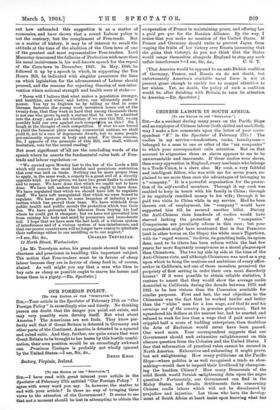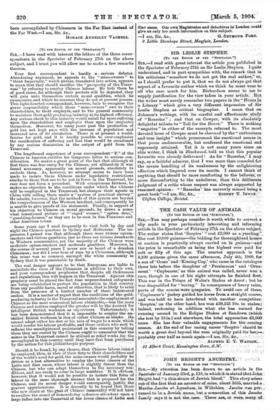CHINESE LABOUR IN SOUTH AFRICA.
[To THE EDITOR OF THE " SPECTATOR."] SIR,—As a resident during many years on the Pacific Slope and an employer of Chinese labour (both skilled and unskilled), may I make a few comments upon the letter of your cm-re- spondent "F." in the Spectator of February 27th? The coolies in my service—woodcutters, cooks, laundrymen— belonged to a man to one or other of the "six companies" to which your correspondent calls attention. But on that account to stigmatise them as slaves appears to me to be unwarrantable and inaccurate. If these coolies were slaves, then every apprentice in England, every mechanic who belongs to a Trade-Union, is a slave also. My cook, a very faithful and intelligent fellow, who was with me for seven years, ex- plained to me more than once the advantages of belonging to a "company." It is a powerful organisation for the protec- tion of its self-enrolled members. Through it my cook was enabled to keep in touch with his family in China ; through it be regularly remitted money to his wife ; through it he paid two visits to China while in my service. Had be been thrown out of employment, his " company " would have supported him till he secured another billet. During the Anti-Chinese riots hundreds of coolies would have starved lacking the protection of their " companies." Comparisons are peculiarly odious in this case; but your correspondent might have mentioned that in San Francisco (and in other towns on the Slope) the white man's Tigertown, with its "caged women," its dives, its gambling hells, its opium dens, used to be (there has been reform within the last few years) far more flagrantly conspicuous as a moral plague-spot than Chinatown. The two lay side by side at the time of the Anti-Chinese riots, and although Chinatown was used as a peg upon which to hang the orations and ambitions of every office- seeker in California, not one of these moralists perceived the propriety of first setting in order their own most disorderly houses ! If it were possible to obtain reliable statistics, I venture to assert that they would show the average coolie domiciled in California during the decade between 1875 and 1885 to be less vicious than the Caucasian available for similar purposes. First and last, the real objection to the Chinaman was the fact that be worked harder and better than the " white " man for a less wage, and that he sent his earnings out of the country (a genuine grievance). Had he squandered his dollars at the nearest bar, had he exacted and refused to work for less than a wage that if paid must have crippled half a score of budding enterprises, then doubtless the Acts of Exclusion would never have been passed. One word more. Your correspondent suggests that our Government should seek exhaustive enlightenment on this obscure question from the Colonies and the United States. I fear that information of practical value cannot be secured in North America. Exhaustive and exhausting it might prove, but not enlightening. How many politicians on the Pacific Slope—where politics is as well recognised a trade as shoe- making—would dare to imperil their livelihood by champion- ing the heathen Chinee P How many Democrats of the solid South would furnish enlightening data upon the negro question ? Fortunately, our Government can find in the Malay States and Straits Settlements facts concerning Chinese coolie labour which will not be discoloured by prejudice and injustice. Let those who have the develop- ment of South Africa at heart insist upon knowing what has
been accomplished by Chinamen in the Far East instead of the Far West.—I am, Sir, &c., HORACE ANNICSLEY VIM:CELL. •











































 Previous page
Previous page